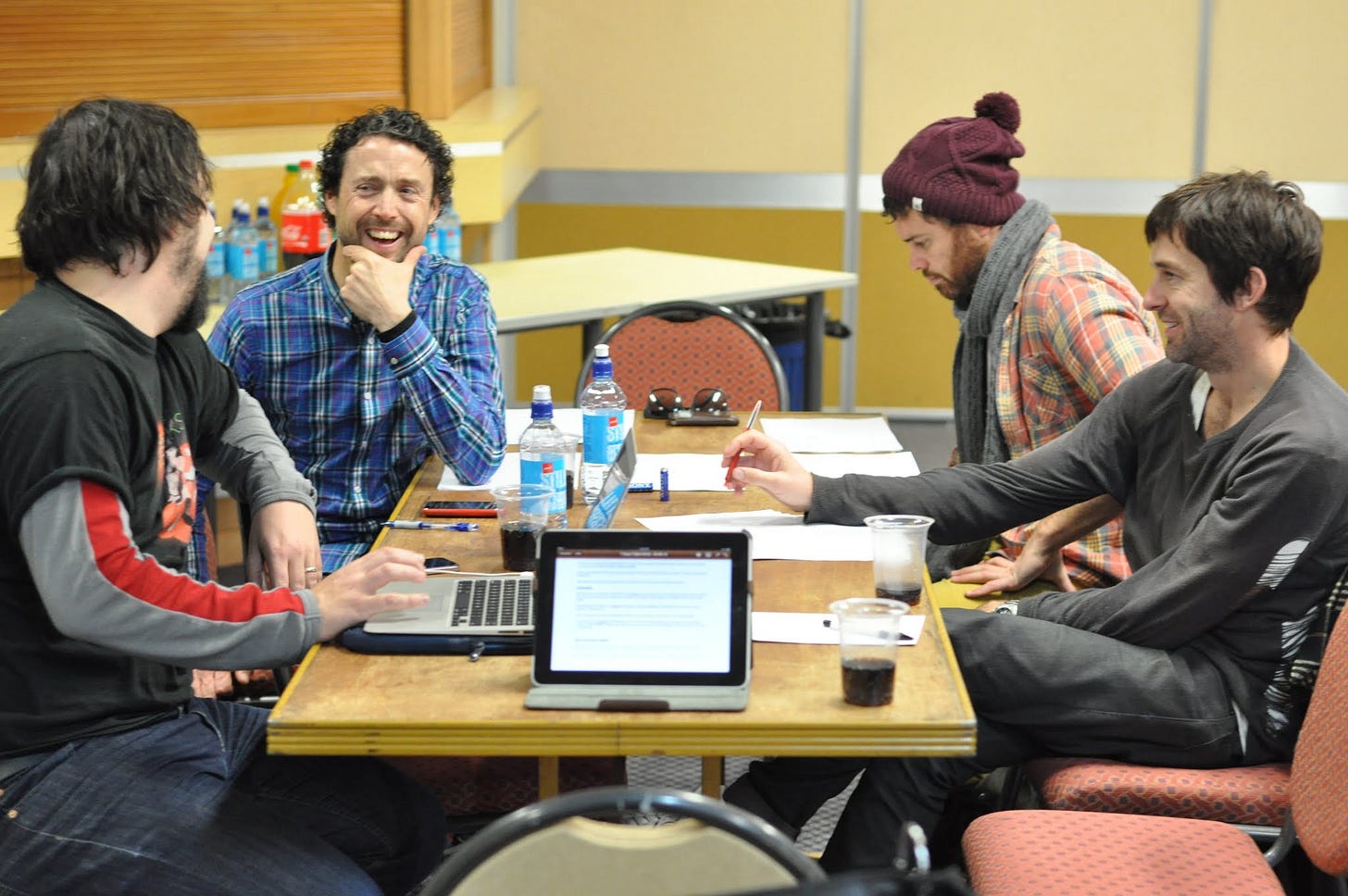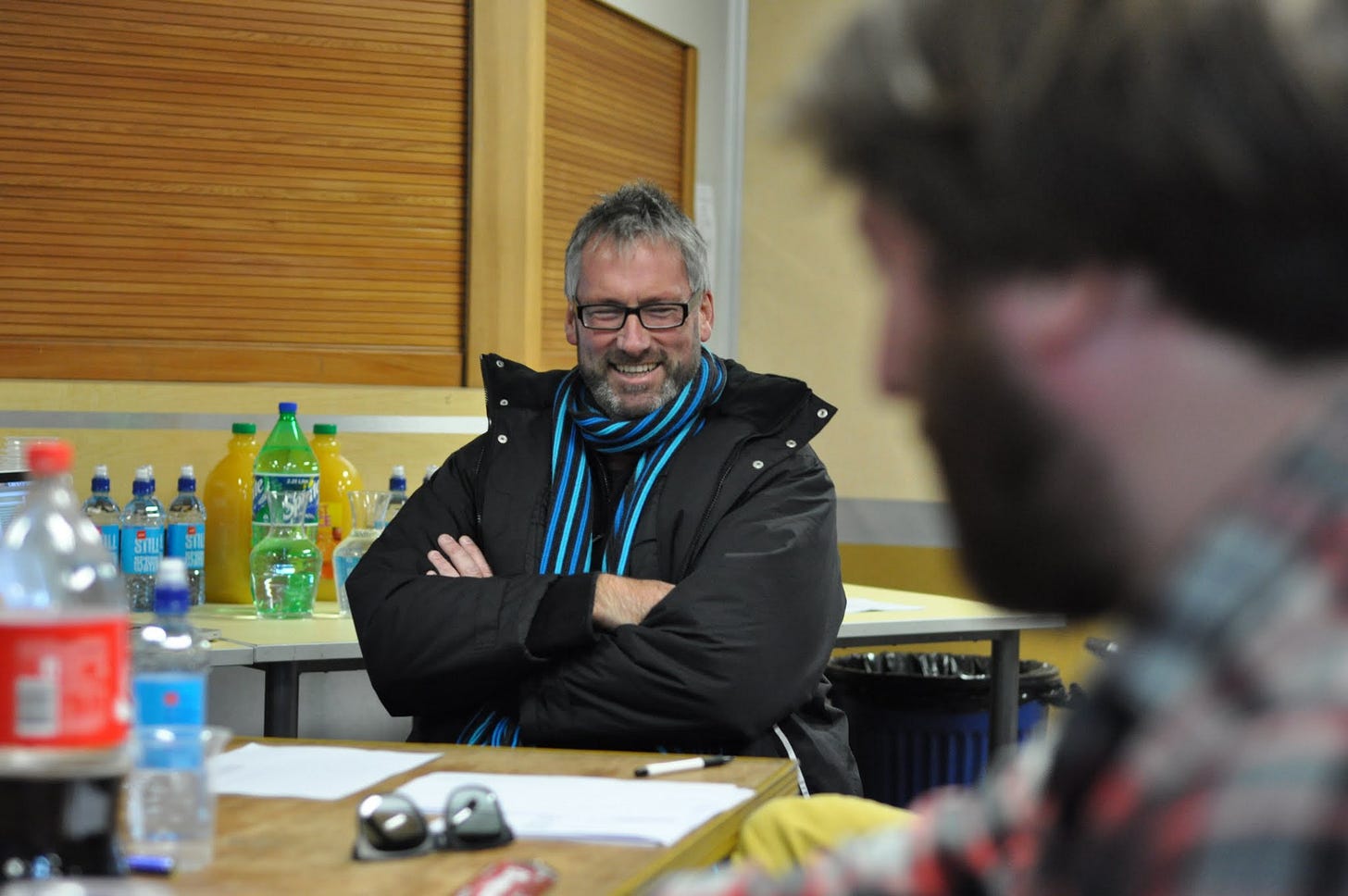Brainstorms are a joke
What we can learn about the creative process from a comedy writing room
I spent a few years as co-head writer on the comedy panel show 7 Days. On Tuesday we’d decide what news stories to cover that week then split into two “rival” writing rooms. On Wednesday I would lead two comedians in one room, while Ben would take two comedians into another then we’d write for a few hours. Then on Thursday we would face off, alternating our best one liners to host Jeremy and a team of producers, who would pick their favourite for each story and put it into a script.
This mix of collaboration and competition resulted in some truly great joke writing. We would churn out dozens of gags each week so very few of them stick with me, though here’s one I still remember:
Christchurch has revealed a new plan to rebuild the central city. The council says it’s phase one of an exciting rebuild programme that will make Christchurch more like the Australian city of Melbourne. Phase two will be for Melbourne to have a big f*cking earthquake.
One of the interesting things about these writing rooms is who worked best in them. You might assume that the funniest, most successful comics would make the funniest, most successful contributors but this was rarely the case. We had one regular who by his own admission was well off the boil career-wise, but was an essential part of the creative mix: “a vibes guy” we used to call him, and even though there were only two slots to fill on each team he got one almost every week because there was no substitute for the energy and laughter he added to the creative process.
Another comic, one of my favourites on stage, could never really find his sweetspot in the writing room. While others would knock around ideas, eventually stumbling on a completed joke, he would sit in silence, unwilling to contribute until he had a line that was word-perfect. Because why share a joke before it was fully formed?
The cliche “there are no bad ideas in a brainstorm” has become a common way of ridiculing people in the office who suggest something stupid when a team is throwing ideas around. But it’s still a crucial ground rule, and it’s worth understanding why.
The individual creative process goes something like this:
Think of an idea
Decide whether it’s right or not
Modify the idea
Return to step 2 until you’re happy
Put it out into the world
Plenty of artists have done very well using this method but the idea of a brainstorm - or a writing room - is that you bring in extra help for steps 2 and 3. If you keep it all in your own head until step 5 you’ll eventually come up with some good stuff, but you’ll have lost the chance to power it up with diverse experiences and perspectives (I use the word ‘diverse’ in its traditional sense here, though of course one of the best arguments for DEI-style diversity is that an organisation is more likely to serve its community if it is creatively-powered by people who reflect that community).
In business (or whatever other organisation you find yourself brainstorming in) this is the best reason for enforcing a “no bad ideas” culture. It fosters a “yes and” environment - where people recognise that the best creative ideas come from unexpected beginnings, and where nobody is getting marked on their first drafts.
At 7 Days we also had “spec writers”, who would work on their jokes alone, at home, then send them in to be pitched alongside those of the writers’ rooms. On the surface this works against the “brainstorm is best” theory, but I think we need to recognise that some people do their best creative work outside of the collaborative pressure-cooker - who in fact freeze up when required to be creative on cue.
I think there’s an argument for including some sort of these what my superstar wife calls “asynchronous” contributions to the creative process. Some people thrive when they can come up with ideas in their own time, make sure they have their wording exactly right, then send an email off to the group. This works particularly well when
the brainstorm is usually dominated by particular voices and personalities; or
participants have a lot going on - work, family, life admin - and tend to think most clearly when they make some time to be creative on their own terms, even if it’s at 9pm when the kids are finally all in bed.
A live brainstorm that everyone who wants to can take part in, a couple of days grace for those who want to submit additional/revised ideas on their own schedule then, finally, a leader who can play host Jeremy and pick the one they like the best. Members of the team can still privately feel that the best idea didn’t get chosen, but they can move forward knowing that they got to contribute in their own way, on their own terms, using the best of the hive mind to supercharge their thinking when they needed it.






🤔 In my experience, often at hui/workshops on various subjects a facilitator would stand by a message board with a whiteboard marker & write down ideas that came from the group in response to a prompt OR participants would write ideas on a Post-it-Note & go up & attach them under various subject headings. In both cases, the group would break up into smaller cells with each one concentrating on a different aspect, and each would report back what they came up with to the facilitator & the other cells. Then the whole group would have the chance to feedback & agree on the strategy/solution/action plan or whatever, which was usually written up & sent to all participants after. A good facilitator was key, but so was being non-judgemental about what people suggested during
As an old retired teacher, supposedly passed my used by date...........the rules of brainstorming changed my life in so many ways..............especially this rule re no bad ideas, all were welcome in the storm. It was a most democratic of spaces, giving all a voice, and fostering a beauty that was tangible in the thoughts and courage of others to speak, to have a say, to be welcomed to think. My wife has been a teacher too, and like myself, one of the loved ones coz we got it...........but often in talking and having the courage to offer an opinion or idea............I sometimes predicate saying something with, 'just brainstorming here'. Because we both know the rules and brainstorming context...........I am protecting my statement from being shot down...........but also offering up a contribution to the situation. Brainstorms are fluid and non critical...beyond party lines and springboards for creative ideas............oh that the world, and our own slice of pavalova was run along these lines....or that parliament could operate with an awareness of that process. Great read Jesse. Love 7 Days. We all have a roll to play, shine in some contexts, but all valued in the process. Love the egalitarian nature of it.